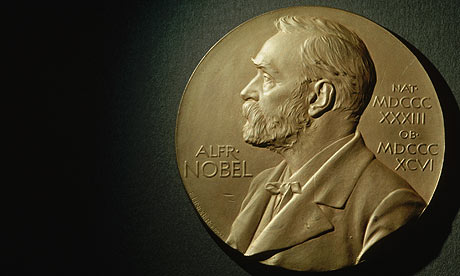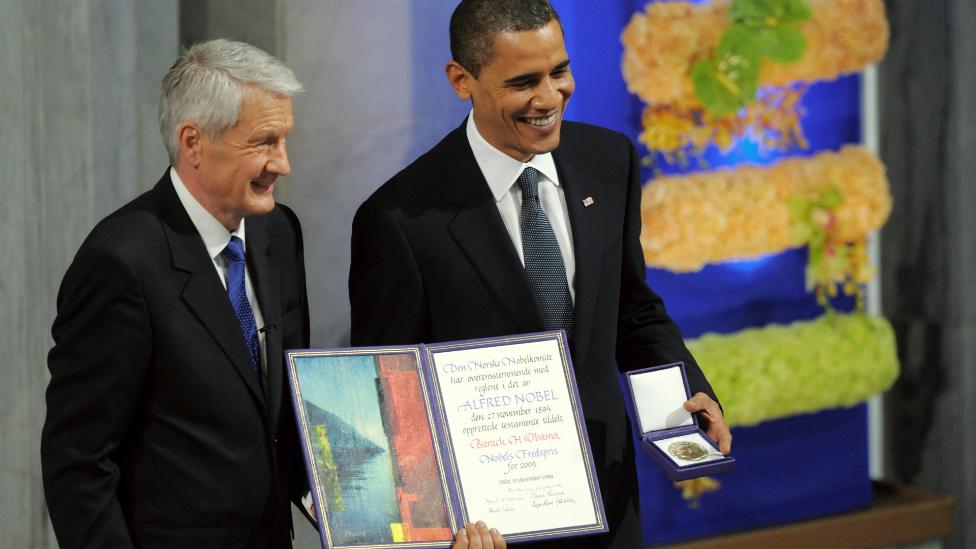Why Did Obama Get the Nobel Peace Prize? The Complete Story Behind the Controversial 2009 Award
Why Did Obama Get the Nobel Peace Prize? The Complete Story Behind the Controversial 2009 Award
When the Norwegian Nobel Committee announced on October 9, 2009, that President Barack Obama would receive the Nobel Peace Prize, the world was stunned. Just nine months into his presidency and less than two weeks after taking office when nominations closed, Obama became one of the most controversial Nobel Peace Prize recipients in history. This comprehensive analysis explores the reasons behind this unprecedented decision and its lasting impact.

The Official Reasons: "Extraordinary Efforts" in International Diplomacy
The Norwegian Nobel Committee cited Obama's "extraordinary efforts to strengthen international diplomacy and cooperation between peoples" as the primary reason for the award. The committee specifically highlighted several key factors that influenced their decision:
Nuclear Disarmament Vision
The committee placed special importance on Obama's vision and work toward "a world without nuclear weapons." This vision had been articulated in Obama's April 2009 speech in Prague, where he outlined America's commitment to nuclear disarmament and non-proliferation efforts.

Multilateral Diplomacy Renaissance
According to the Nobel Committee, Obama had "created a new climate in international politics" by restoring multilateral diplomacy to a central position. The committee emphasized his support for the United Nations and other international institutions as instruments for resolving global conflicts.
Outreach to the Muslim World
Obama's historic speech in Cairo in June 2009, titled "A New Beginning," significantly influenced the committee's decision. This address was seen as a groundbreaking effort to reset America's relationship with Muslim-majority countries and promote dialogue between civilizations.

The Unprecedented Timeline: A Record-Breaking Award
What made Obama's Nobel Prize truly unprecedented was the timing. The nomination deadline for the 2009 prize was February 1, 2009—just 11 days after Obama took office on January 20. This meant the committee was essentially awarding Obama based on his presidential campaign promises and early policy announcements rather than concrete achievements.
Obama became the fourth U.S. president to win the Nobel Peace Prize, joining Theodore Roosevelt (1906), Woodrow Wilson (1919), and Jimmy Carter (2002). However, he was the first to receive it during his first year in office and the youngest sitting president to be honored at age 47.
The Selection Process: Behind Closed Doors
The five-member Nobel Committee, appointed by the Norwegian Parliament, made their decision unanimously on October 5, 2009. However, this unanimity wasn't immediate. Committee chairman Thorbjørn Jagland had to strongly persuade members from the Socialist Left, Conservative, and Progress parties to support Obama's selection.
Jagland later explained that the committee was influenced by Obama's transformational impact on international relations, stating: "No one could deny that 'the international climate' had suddenly improved, and that Mr. Obama was the main reason."

Obama's Response: Surprise and Humility
Obama himself was reportedly "surprised" and "deeply humbled" by the award. In his Rose Garden statement, he emphasized that he viewed the prize "not as a recognition of my own accomplishments but rather an affirmation of American leadership on behalf of aspirations held by people in all nations."
Demonstrating his commitment to the award's humanitarian spirit, Obama donated the entire $1.4 million prize money to various charitable organizations, including the Fisher House Foundation ($250,000) and the Clinton Bush Haiti Fund ($200,000).

The Controversy: Critics Across the Political Spectrum
The award generated unprecedented criticism from across the political spectrum. A USA Today/Gallup poll revealed that 61% of Americans believed Obama didn't deserve the prize, while only 34% thought he did.
Media Reaction
Major publications questioned the decision. The New York Times called it a "stunning surprise," while The Washington Post described it as "odd" and potentially embarrassing. Even Obama supporters like columnist Thomas Friedman expressed dismay, saying the award had been "devalued."
International Skepticism
The reaction wasn't limited to America. Former Polish president Lech Wałęsa called the award "premature," while Taliban spokesman Zabiullah Mujahid sarcastically suggested Obama should have won the "Nobel Prize for escalating violence and killing civilians."
The Long-Term Impact and Regrets
In 2015, Geir Lundestad, the former Nobel Committee secretary, published a memoir revealing that the committee's hopes hadn't been fulfilled. He wrote: "Many of Obama's supporters believed it was a mistake," and admitted that Obama had failed to live up to the committee's expectations.
Critics later pointed to Obama's expansion of drone warfare, particularly in Pakistan, and continued military involvement in Iraq and Afghanistan as evidence that the peace prize was premature. By 2013, online petitions calling for the Nobel Committee to rescind the award had garnered nearly 20,000 signatures.

Obama's Nobel Lecture: Defending the "Just War"
When Obama accepted the prize in Oslo on December 10, 2009, he delivered a remarkable 36-minute speech that addressed the apparent contradiction of a wartime president receiving a peace prize. He discussed the concept of "just war," saying: "Perhaps the most profound issue surrounding my receipt of this prize is the fact that I am the commander-in-chief of the military of a nation in the midst of two wars."
The speech was generally well-received, with both liberal and conservative commentators praising its intellectual honesty and realistic approach to international relations.
Frequently Asked Questions
Q: How long had Obama been president when he won the Nobel Prize?
A: Obama had been president for just 8.5 months when the award was announced, and only 11 days when the nomination deadline passed.
Q: What specific achievements led to Obama's Nobel Prize?
A: The committee cited his vision for nuclear disarmament, efforts to strengthen international diplomacy, multilateral approach to foreign policy, and outreach to the Muslim world, particularly his Cairo speech.
Q: How much money did Obama receive with the prize?
A: Obama received 10 million Swedish kronor (approximately $1.4 million), which he donated entirely to charity.
Q: Did the Nobel Committee later regret the decision?
A: Yes, former Nobel Committee secretary Geir Lundestad admitted in 2015 that the committee's hopes were not fulfilled and that many of Obama's supporters considered it a mistake.
Q: How did other world leaders react to Obama's Nobel Prize?
A: Reactions were mixed. While allies like French President Nicolas Sarkozy and UN Secretary-General Ban Ki-moon praised the decision, many others, including former Polish president Lech Wałęsa, called it premature.
Conclusion: A Prize That Changed Nobel History
Obama's 2009 Nobel Peace Prize remains one of the most debated awards in Nobel history. While the committee intended to encourage and strengthen Obama's diplomatic efforts, the decision ultimately highlighted the risks of awarding prizes based on potential rather than achievement. The controversy surrounding this award continues to influence discussions about the Nobel Peace Prize's credibility and selection criteria today.
Whether viewed as a prescient recognition of transformational leadership or a premature political statement, Obama's Nobel Prize serves as a fascinating case study in international diplomacy, media reaction, and the intersection of politics and prestigious awards.
Share this comprehensive analysis: Help others understand the full story behind one of history's most controversial Nobel Peace Prizes. Share this article to spread knowledge about this pivotal moment in international relations.